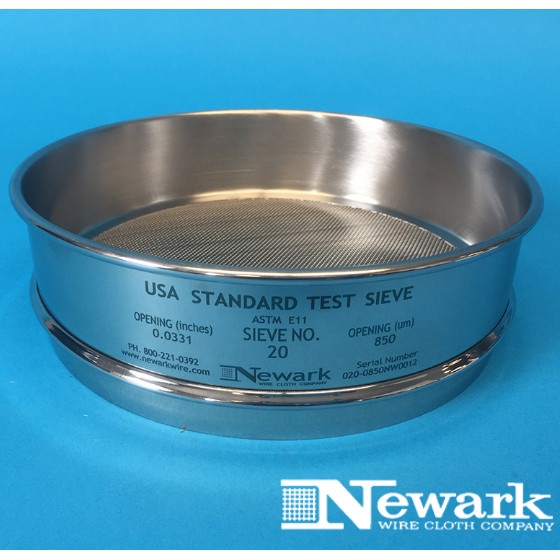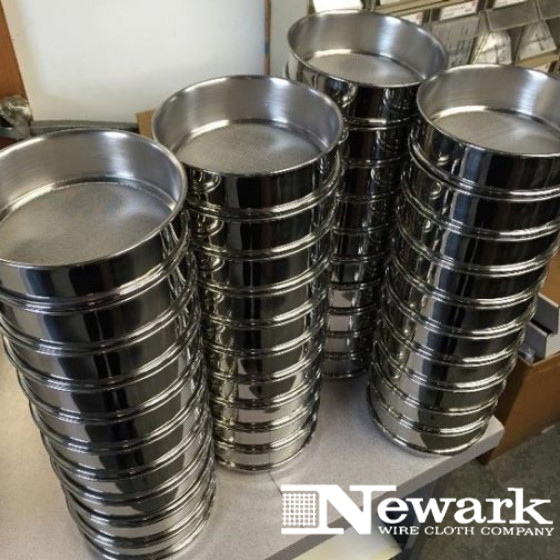Newark Wire News
Newark Wire News
Questions You Should Ask About Test Sieves

Many industries use USA standard test sieves to separate dry or superfine particles during manufacturing or for wet washing silt and dirt from bulk aggregate reclaimed from mining or agricultural processes. The basic design specs of different types of sieves will always drive your initial selection of a sieve. These include the frame size and the mesh or screen opening size. Both of these depend upon your particular process equipment and the size of the particles to be screened.
However, not all types of sieves are equally built. Here are some questions to ask and the answers you should be looking for to help in choosing a test sieve manufacturer that provides the highest quality test sieve assembly, that can be used for many applications and serves a wide range of industries.
SAQ When Choosing Sieves

Does the test sieve conform to industry standards?
The best test sieves are constructed with a stainless steel sieve cloth that should conform to ASTM E11 or ISO 3310 specifications. These standards give best practices for the design and construction of test sieves that are frame-mounted, along with the details on particle size and mesh perforations dimensions for a wide range of materials.
Is a test sieve certification required?
Some industries such as pharmaceutical manufacturing have stringent standards that may require laboratory sieves manufactured to fit a specific standard. The manufacturer performs a test sieve analysis to document and certify the sieve meets specific specifications. For many other industries, Market Grade sieves use a high-strength square-mesh cloth or a Mill Grade mesh that has smaller wires for the screen manufacturing.
What is the best material for mesh construction?
A stainless steel sieve frame and woven mesh are the preferred material of construction for high-quality construction. Stainless steel offers a high degree of corrosion resistance which is critical with industries that are introducing moisture or caustic fluids into the filtering component. Stainless steel sieves will also last longer and will not add contamination into the filtering process. Tin plated steel and brass frames are the less optimal choice.
What are industrial test sieve sizes?
The size of the openings within the test sieve mesh is critical to proper functioning and filtering. Choose a manufacturer that offers a wide range of opening standard sieve sizes from 4” mesh (100mm) to 635 mesh (20um). The frame which supports the woven mesh cloth is available in standard U.S. sizes including 3 inch, 8 inch and 12 inch. International frame sizes are standardized at 100mm, 200mm and 300mm. The mesh wire diameters are also considered and can range from 8 mm for 125-mm mesh to 0.020 mm for 20-µm mesh.
What to consider in a quality sieve frame?
The durability of your test sieve will depend greatly on the quality of the frame and how the mesh cloth is mounted and secured. Consider a sieve where the frame thickness is clearly stamped using a robust thickness such as 22 ga. sheet metal. This thickness can be 37% greater than the sieve frames found on lower quality test sieves.
What is the price range for test sieves?
There are many factors that contribute to the final cost of test sieves, including the type of sieve, the alloy material, the mesh and sieve frame sizes, the sieve uses you had in mind, and whether the assembly needs to be certified. Wet test sieves will typically cost more than standard sieves. As the frame diameter and sieve height increases, so will the price. The main factors that drive the price of test sieves are the quality of the mesh material and the size of the perforations in the mesh cloth. The finer the mesh, the more expensive the entire sieve will be as they will provide a higher quality filtration.
Test Sieve Takeaways
- The size of the openings within the test sieve mesh is critical to proper functioning and filtering
- Choose from a wide range of mesh opening sizes from 4” mesh (100mm) to 635 mesh (20um)
- Type of sieve, the alloy material, the mesh and sieve frame sizes can all impact costs.
Visit us at Newark Wire Cloth for a wide range of high-quality, stainless steel sieves to fit applications in many industries, like pharmaceutical, food, agricultural and aerospace.
